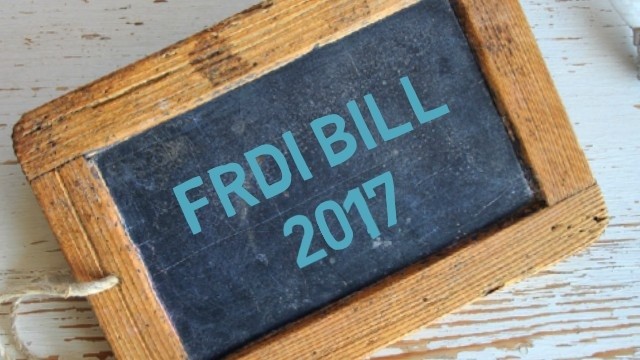Currently there is a wide debate going on within financial sector about proposed Financial Resolution and Deposit Insurance Bill (FRDI). Main concern is on non-assurance on depositors money and bail-out of weak banks through bank deposit of different bank. Ending the debate on FRDI will, government has decided to place the proposed bill to get parliament approval.
What is the proposed FRDI bill and why people are raising concerned on it ?
India’s financial sector reforms started since 1991 for all the sectors including banks, insurance, mutual fund, pension. Prior to 1991 all these categories were government owned and fear of failure was minimal. Hence there were no need for market regulator to control the mechanism.
Slowly the market expands and lot of private players including foreign investment made in to these wide categories. There was a need of market regulator to control the complexity and change in oversight.
The market regulator which were incorporated started setting up the rules for operational functionality of private sector bank or insurance company or mutual fund or pension manager. They brought the discipline in the financial market like what they can or cannot do and what happens when they not follow the policies. Slowly and slowly with the development in the financial sector, the complexities were added up.
Read : No MDR charges on Debit Cards, BHIM UPI Transactions at Merchant PoS
Post 2008 financial sector crisis, after the fall of Lehman brothers, it was felt that how could the financial sector lead to an entire system crashing due to the sudden failure of one firm. Keeping such activities in mind, government decided to put in place systems and processes for an early warning system of financial firm failure in the form of resolution system.
Hence the Financial Resolution and Deposit Insurance Bill or FRDI has come in to picture, in order to meet the global expectation of meeting the reform in its financial sector.
What are the content of FRDI Bills ?
We have seen in above para, why there was a need for creation of FRDI bills ? Let’s see further what are the major proposed rules in this ?
The FRDI Bill proposed the creation of separate entity i.e. Financial Resolution Resolution Corporation (FRC) that will put in place a system to monitor financial firms such as banks, insurance companies, stock exchanges, and payment systems.
FRC will look after the ill health of the banks, insurance companies and take a decision on their liquidity.
FRC is empowered additional to take decision in case of liquidity of banks. They are empowered higher than RBI.
FRC will signal out the faulty bank and raise the alarm in case of bankruptcy.
Currently India doesn’t have any rules/regulator placed in the system to detect the early bankruptcy.
Read : Top Reasons – Why Bitcoin is a Risky Investment ?
What does the FRDI Bill propose?
Financial resolution corporation (FRC) will be having representatives from all financial sector regulators, the ministry of finance and some independent directors. FRC will form the set of rules which will classify the financial firms into five categories based on their risk of failure:
1. Low risk firm
2. Moderate risk firm
3. Material risk
4. Imminent Risk
5. Critical risk to viability
The evaluation of risk will be measured on the metrics of capital adequacy, assets and liability, asset quality, capability of management, earnings sufficiency, leverage ratio, liquidity of the firm and so on. Both the sector regulators and the RC will classify and monitor firms.
What happens to my bank deposits ?
Now discussion about million dollar question, which is the major reason for concern. Depositor wants to know, what does bill speak about their money ?
Any one who is raising concern on FRDI bills must understand the difference between the clause Bail-In and Bail-out.
Read : How To Calculate Fixed Obligation to Income Ratio (FOIR) in Loans ?
Bail-in – This is opposite of Bail-out. In a bail-in, it is the debt of the firm that is either written off, or subject to a haircut or changes form. Now think your bank deposit is a liability or a debt for the bank, so can your money be used for a ‘bail-in’? Where there is a loss of bank deposit ? or Depositor will loose all their money.
Currently there is more risk on depositor money. Today, the Deposit Insurance and Credit Guarantee Corporation (DICGC) insures bank deposits up to Rs1 lakh. The FRC will also insure bank deposits and the insured limit will be set in consultation with the RBI.
Additionally banks are brought under strict norms where they need depositor consent to bail-in through this money. There is an additional protection for depositors because the bail-in can be invoked and your deposits be lost only if you have given your consent to the bank when you signed the deposit forms.
Bail-out – In a bail-out, an external agency helps out a distressed firm. We should more concerned being a taxpayers as bail-outs happen when financial firms fail without a process in place and tax payer money are being used to pay for the inefficiency of banks that made loans they cannot recover.
Further, the public sector bank recapitalization option will remain there even after creation of FRC through FRDI bills.
Let’s decide whether FRDI bills is really a killer or protector. Awaiting your response on this.
